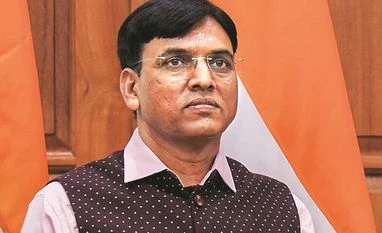Collaborative and collective efforts among countries in the WHO South-East Asia Region and equitable access to prevention, diagnosis and treatment options are pivotal to ending TB, Union Health Minister Mansukh Mandaviya said on Thursday, citing the lessons from the COVID-19 pandemic.
Delivering the keynote address at a ministerial meeting on "Sustain, Accelerate, and Innovate to end TB in the South-East Asia Region", Mandaviya reiterated India's commitment of eliminating TB from the country by 2025, five years ahead of the global deadline.
The meeting was co-chaired by WHO Director-General Tedros Adhanom Ghebreyesus here on Thursday.
The event witnessed a significant milestone in the signing of the Gandhinagar Declaration, which calls for establishing a high-level multisectoral commission reporting to the highest political level in each country for synergy of efforts among various stakeholders and to monitor progress towards ending TB and other priority diseases.
The declaration is cognizant that despite progress, the WHO South-East Asia Region has missed the 2020 milestones of the End TB Strategy and the 2022 coverage targets according to the political commitment made during the UN High-Level Meeting on TB in New York on September 26, 2018.
In his address, Mandaviya said collaborative efforts and equitable access to prevention, diagnosis and treatment options are pivotal to ending TB as demonstrated by the pandemic.
More From This Section
"Combating the prevalent stigma against TB in society, India has been committed to providing, enabling and patient-centric support to all, individuals suffering from TB," he said and lauded the visionary leadership of Prime Minister Narendra Modi.
"India has leveraged the power of data-driven decisions by developing its own mathematical model to estimate TB burden using local evidence. Through its dedicated efforts, India has achieved a 13 per cent reduction in TB incidence and a 15 per cent decrease in mortality from 2015 to 2022, performing better than global averages," he said.
The minister said that through enhanced private sector engagement and sustainable models the notification of TB has improved by as high as seven times in the past decade.
Highlighting the "RATION" trail which was recently published, Mandaviya stated, "It validates the importance of nutrients in reducing TB mortality as well as incidence."
In its mission to eliminate TB and combat stigma, the health minister enumerated measures of implementing a family-centric care model and a first-of-its-kind community engagement mechanism known as 'Ni-kshay Mitras' under the Pradhan Mantri TB Mukt Bharat Abhiyan to provide additional nutritional, diagnostic and vocational support to TB patients.
He referred to the Ni-kshay Poshan Yojana for providing monthly nutritional support to those on TB treatment through direct benefit transfer. It has successfully provided 7.5 million TB patients with over USD 244 million in their respective bank accounts.
In his address, the WHO director-general lauded the progress and efforts for combating TB.
"I commend India for its innovative approach, multi-sector partnership efforts, and funding for ending TB. This has given inspiration to other countries," he said.
He stressed that global health crises such as the pandemic have reversed the progress gained in many countries, and though the goal of eliminating TB by 2030 seems ambitious, it is still achievable.
"We have new and powerful tools which reduce testing times, which are game-changers in treatment and healing of TB patients," he said.
The event was attended by Dr Hans Henri Kluge, WHO Regional Director for Europe and Dr. Poonam Khetrapal Singh, WHO Regional Director for South-East Asia.
The health ministers of several countries in the WHO South-East Asia Region - Zahid Maleque (Bangladesh), Dechen Wangmo (Bhutan), Safiyya Mohammed Saeed (Maldives), Mohan Bahadur Basnet (Nepal) and Keheliya Rambukwella (Sri Lanka) - attended the meeting.
Health Minister of Indonesia Budi G. Sadikin shared a recorded message.
Dr Odete da Silva Viegas, Director General of Health Services, Timor-Leste, and Francoise Vanni, Director of External Relations and Communications, Global Fund, also participated in the event.
)